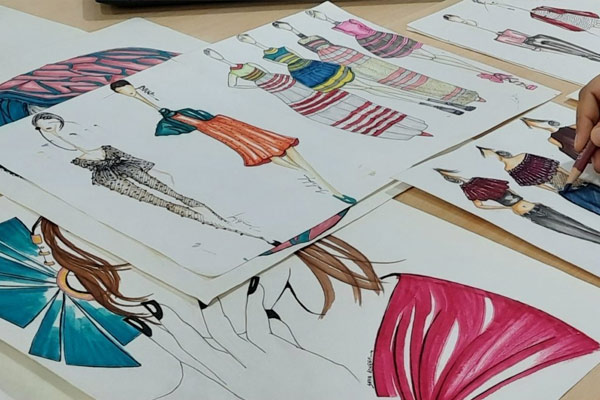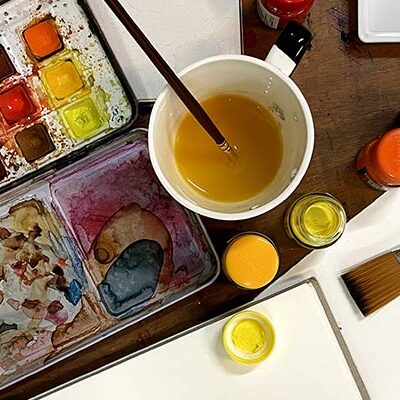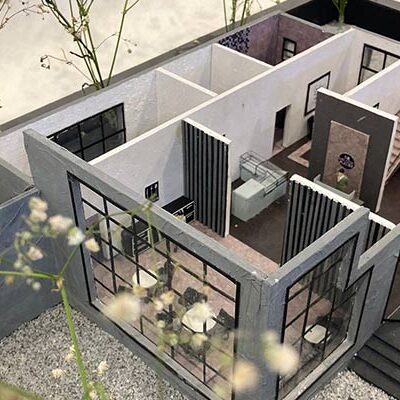B.Des in Fashion Design
The Bachelor of Design in Fashion Design is a comprehensive program that equips students with the essential skills and knowledge to thrive in the dynamic world of fashion. This course delves into various aspects of fashion design, including garment construction, textiles, pattern making, and trend analysis. Through a combination of theoretical learning and practical experience, students develop their creativity, technical proficiency, and critical thinking abilities. They learn to conceptualize and execute innovative designs while also gaining insights into the historical and cultural contexts of fashion. Additionally, the program often incorporates industry-relevant projects, internships, and collaborations with professionals, preparing graduates for successful Careers in Fashion Design.
What you must learn to become a Fashion Designer?

At Indus Design School, aspiring fashion designers learn a comprehensive array of skills essential for success in the dynamic Fashion Industry. Through a blend of practical training and theoretical knowledge, students delve into garment construction, pattern making, textiles, and trend analysis. Our curriculum emphasizes creativity, innovation, and the ability to communicate design concepts effectively. With access to state-of-the-art facilities and experienced faculty, students develop their unique design aesthetic while gaining insights into the cultural and historical contexts of fashion. Upon graduation, our students are equipped with the expertise and confidence to embark on fulfilling careers as Fashion Designers, ready to make their mark in the ever-evolving world of style and design.
Key Learning Areas
1. Design Fundamentals: Develop a strong foundation in design principles, color theory, and textile manipulation.
2. Garment Construction: Acquire hands-on experience in pattern-making, draping, and sewing techniques to bring your designs to life.
3. Fashion Illustration: Hone your artistic skills to effectively communicate your design concepts visually.
4. Fashion History and Trends: Gain insights into the evolution of fashion, understanding its historical context, and staying abreast of current trends.
5. Digital Design Tools: Learn to leverage cutting-edge design software for pattern drafting, 3D modeling, and virtual prototyping.
6. Fashion Marketing and Branding: Consumer Behavior Analysis, Understand the psychology behind consumer choices and its implications for marketing.
7. Retail Merchandising: Explore strategies for effective product placement, visual merchandising, and retail management.
8. Fashion Entrepreneurship: Develop comprehensive business plans for launching and sustaining a fashion enterprise.
9. Sustainable Fashion Practices: Embrace eco-friendly and sustainable approaches in garment construction, including upcycling and zero-waste patterns.
Course Structure
- Without a tangible form of your imagination in visibility, your creation cannot come to life. We at IDS understand the importance of beginning from the basics.
- A design student needs to enhance their creative confidence, sketching skills & geometry, this should be a continuous process as the first outline should be as simple as possible, appealing and constructive. A clear communication of your innovation is central to a work of art.
- To help develop artistic thinking, and break the rigid approach of applying ideas.
- Students will learn about the rise of fashion, its impact on society & lifestyle, and differences in presence of style at a particular time period.
- Developing a strong visualization power for efficient conception of ideas.
- Learning about the ongoing as well as past fashion trends. This helps to develop the capability of observation, and learn through trial & error.

Subjects of the Curriculum
Study of heritage Crafts and Relative Study Program (RSP) will help students in enhancing the quality of their designs as they learn & experiment to create something extraordinarily beautiful & functional. Through this, our crafts will be able to have a platform, thus increasing the awareness & recovery of their lost identity. Self-exploration and workshops will enable them to grow in their own unique way, learning as they move forward under our guidance.
- Sketching and Illustration (manual & digital)
- Effective Communication
- Garment Construction/Sewing
- Pattern Making
- Fashion Illustrations
- Understanding of Textiles & Trims
- Trend Forecasting & market research
- Fashion Styling
- Visual Merchandising & Marketing
- Sustainability in fashion
- Craft Documentation
- Related Study Program
- Portfolio & Design Collection Development
Career Paths
- Fashion Designer
- Graphic Designer in fashion
- Couturier
- Design Director
- Fashion Director
- Fashion Curator
- Style Advisor
- Consultant
- Fashion Buyer/Merchandiser
- Fashion Coordinator
- Fashion Critic
- Fashion Illustrator
- Creative Director
- Independent Fashion House




